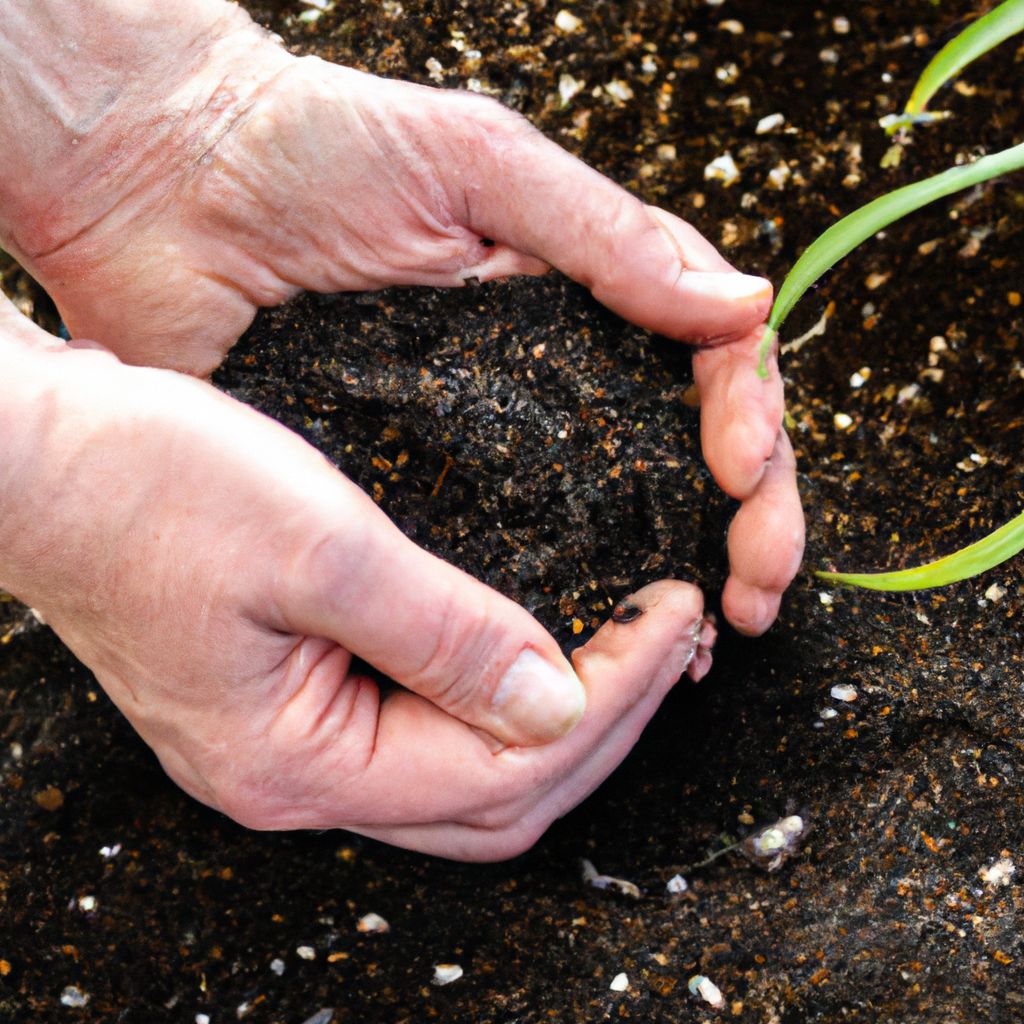Key Takeaways:
- Soil amendments are crucial for successful greenhouse gardening as they provide numerous benefits, such as improved soil structure, enhanced nutrient availability, and increased water-holding capacity.
- There are different types of soil amendments available for greenhouse plants. Organic amendments, such as compost and peat moss, help improve soil fertility and enhance microbial activity. Inorganic amendments, like perlite and vermiculite, aid in improving soil aeration and drainage.
- Creating a super soil for optimal plant growth involves using key ingredients like organic matter, vermicompost, and biochar, along with appropriate fertilization practices. This can result in healthier plants with increased yields and better overall growth.
Introduction: Greenhouse Soil Management And Amendments
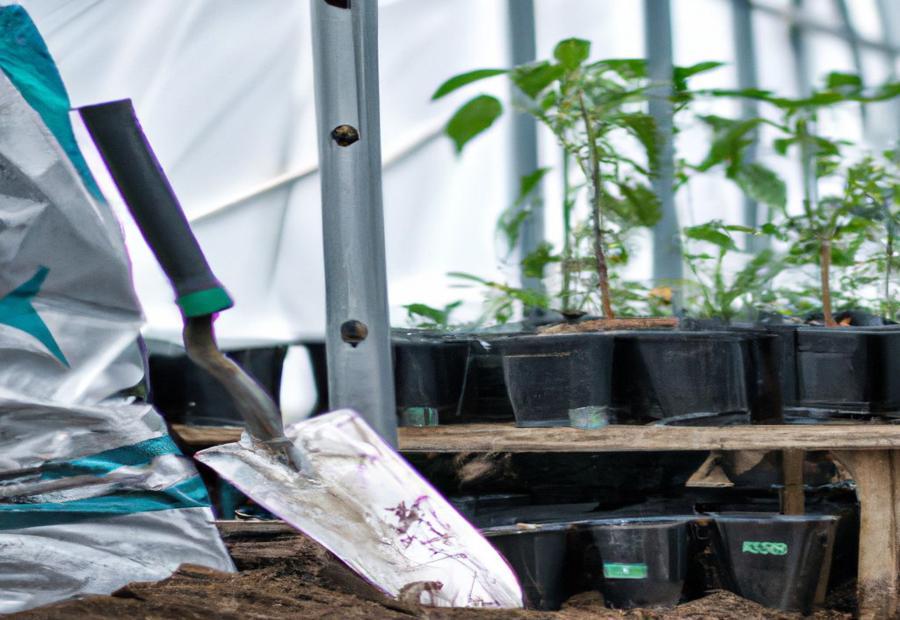
Photo Credits: Gardeninggurus.Org by Jacob Walker
Greenhouse soil management and amendments are crucial factors in successful greenhouse gardening. In this section, we will explore the importance of soil amendments and how they contribute to the health and productivity of plants in a greenhouse environment. By understanding the significance of proper soil nutrition and composition, gardeners can optimize their yields, prevent nutrient deficiencies, and create an ideal growing environment for their plants. So let’s dig deep into the world of greenhouse soil management and amendments for thriving gardens.
Importance of Soil Amendments in Greenhouse Gardening
Soil amendments are critical for greenhouse gardening. They improve the physical, chemical, and biological properties of the soil. There are two main types: organic and inorganic. Organic amendments include compost and peat moss, while inorganic amendments include perlite and vermiculite.
Creating a super soil is essential for optimal plant growth. It involves using key ingredients that provide essential nutrients and promote healthy root development. Fertilization should also be implemented to ensure plants get enough nutrition.
Monitoring plant signs and providing nutrient amendments are also vital. Maintaining proper nutrient balance is crucial for avoiding deficiencies or excesses that can hinder plant health. Understanding the signs of nutrient deficiencies allows gardeners to address them with amendments.
Organic matter in the soil offers various benefits for plant health in greenhouses. It improves soil structure, increases water retention, and enhances nutrient cycling. Sustainable gardening practices, such as incorporating organic amendments, can further improve soil health and long-term productivity.
By utilizing specific soil management practices and implementing targeted amendments, it is possible to reduce the need for supplemental nutrients in greenhouses. Properly managing the soil through techniques like crop rotation, cover cropping, and pH adjustment can promote enhanced fertility over time, further stressing the importance of soil amendments in greenhouse gardening.
Benefits of Soil Amendments for Successful Gardening
Soil amendments are key for successful greenhouse gardening. They offer a range of benefits, from improved nutrient availability to weed suppression. This leads to stronger root systems, healthier plants, and increased productivity.
Let’s look at the advantages:
- Nutrients: Organic matter boosts nutrient availability and helps plants access essential elements.
- Water: Compost and peat moss improve soil moisture retention.
- Drainage: Perlite and vermiculite create air pockets, avoiding waterlogged conditions.
- Weeds: Natural weed suppressants reduce competition.
- Microorganisms: Organic matter provides habitats for beneficial microorganisms.
Combining different amendments can yield even more benefits. It’s important to consider the needs of each plant species and use suitable amendments. This will create an ideal environment for successful growth.
Different Types of Soil Amendments
Soil amendments are key to greenhouse gardening. Various types are available, split into two groups: organic and inorganic. Organic amendments, such as compost and peat moss, originate from plants or animals. They help improve soil structure, water retention, and give nutrients to plants. Inorganic amendments, like perlite and vermiculite, are mineral-based. They provide drainage, prevent compaction, and promote aeration. Each type of amendment serves a different purpose. Gardeners must select the right combination for their plants’ needs. This way, they can create an ideal growing atmosphere for healthy growth.
Choosing the Right Soil Amendments for Greenhouse Plants
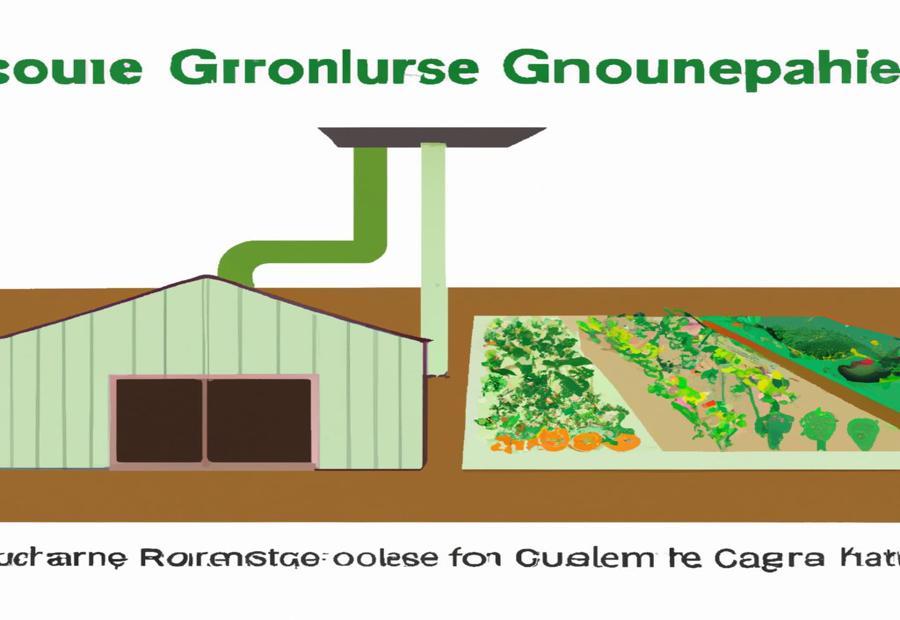
Photo Credits: Gardeninggurus.Org by Timothy Rodriguez
Choosing the right soil amendments for your greenhouse plants is crucial for their overall health and productivity. Discover the benefits of organic amendments like compost and peat moss, as well as inorganic amendments like perlite and vermiculite. Whether you’re aiming for improved water retention or enhanced aeration, understanding the role of different soil amendments is essential for successful greenhouse soil management. Let’s explore the world of soil amendments and learn how to create an optimal growing environment for your greenhouse plants.
Organic Amendments: Compost, Peat Moss, and More
Text:
Organic amendments are key for greenhouse gardening soil management. Compost, peat moss and more provide many advantages for successful plant growth.
- Compost boosts soil with nutrients and its structure, better water retention and drainage.
- Peat moss raises organic matter content of soil, acidity levels, and aeration.
- Coco Coir is an eco-friendly alternative to peat moss. It helps moisture retention and air circulation.
- Biochar helps retain moisture, reduces nutrient leaching, and helps beneficial microbial activity in the soil.
- Bone Meal is full of phosphorus, great for root development and plant growth.
- Gypsum improves soil structure by lowering compaction and nutrient availability.
These amendments give the soil recipe essential ingredients for optimal plant growth. Fertility is increased, nutrient uptake is promoted, drainage and aeration capabilities are improved. By using these amendments, gardeners can create an environment that promotes healthy plant growth without synthetic fertilizers or too much supplemental nutrients.
Inorganic amendments, like perlite and vermiculite, offer a non-organic alternative for soil improvement. But they don’t give the same organic benefits as organic amendments. So, for true organic gardening, it’s best to use natural options.
Choose wisely and let your plants enjoy the organic amendments!
Inorganic Amendments: Perlite, Vermiculite, and More
Organic greenhouse gardening can be hugely improved by using inorganic amendments such as perlite and vermiculite. These amendments strengthen soil structure, improve aeration, and boost water-holding capacity, helping plants to grow roots and absorb nutrients.
Refer to the table below to get a full understanding of the characteristics of these soil amendments:
| S.No. | Amendment | Characteristics |
|---|---|---|
| 1 | Perlite | Lightweight material. Great drainage. |
| 2 | Vermiculite | Keeps moisture well and improves soil. |
Perlite and vermiculite are widely used since they have unique properties. Perlite is light, so it prevents waterlogging and root rot. Vermiculite holds moisture, reducing watering frequency and improving soil texture.
Greenhouse gardening with perlite and vermiculite ensures optimal plant growth with proper soil aeration and moisture retention.
Perlite has been used since ancient times for various purposes. It was known as “pumex“, meaning “foam rock”, in 7 B.C. Vermiculite’s history goes back to the 19th century when it was discovered in U.S. mines.
Creating a Super Soil for Optimal Plant Growth
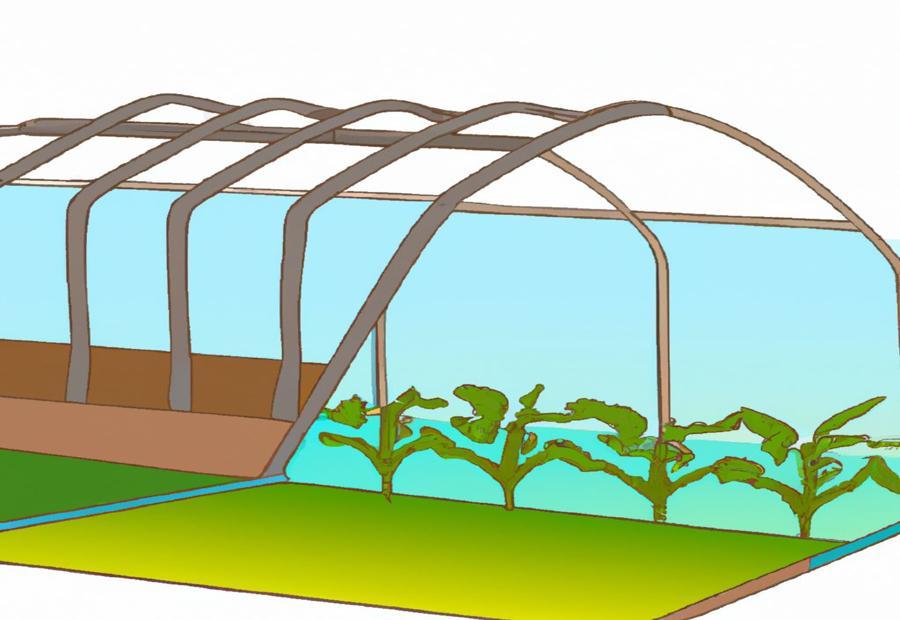
Photo Credits: Gardeninggurus.Org by Bruce Hall
Discover how to create a super soil that promotes optimal plant growth in your greenhouse. Explore the key ingredients necessary for a successful super soil recipe, and learn about effective fertilization practices specifically designed for greenhouse plants. With these insights, you can enhance the health and productivity of your greenhouse garden, ensuring thriving plants and bountiful harvests.
Key Ingredients for Super Soil Recipe
Soil amendments are essential for greenhouse gardening. A super soil recipe can ensure optimal growth for your plants. The recipe needs organic and inorganic ingredients that will enhance soil fertility and provide necessary nutrients. Compost and peat moss are organic amendments, while perlite and vermiculite are inorganic amendments. They help with water retention, aeration, and drainage.
The recipe may require adjustments depending on the plants and environment inside the greenhouse. Monitor the plants’ signs and give nutrient amendments as needed. Sustainable gardening is beneficial for plants and soil health. Create a super soil recipe and make informed decisions to achieve optimal soil health and plant growth.
Fertilization Practices for Greenhouse Plants
Fertilization is key for greenhouse plants’ growth. Fertilizing regularly supplies them with essential nutrients. It’s important to choose fertilizer that suits the plants’ specific needs. Apply fertilizer with top-dressing or by putting it into the soil. Follow instructions from manufacturers about dosage and timing. With this, greenhouse plants will thrive!
To keep the plants healthy, watch for signs of nutrient deficiencies. Make adjustments to the fertilizer when needed. Offer lots of love and care. Then, you’ll have a happy, healthy garden. Good fertilization practices are essential for greenhouse plants’ success!
Monitoring Plant Signs and Providing Nutrient Amendments
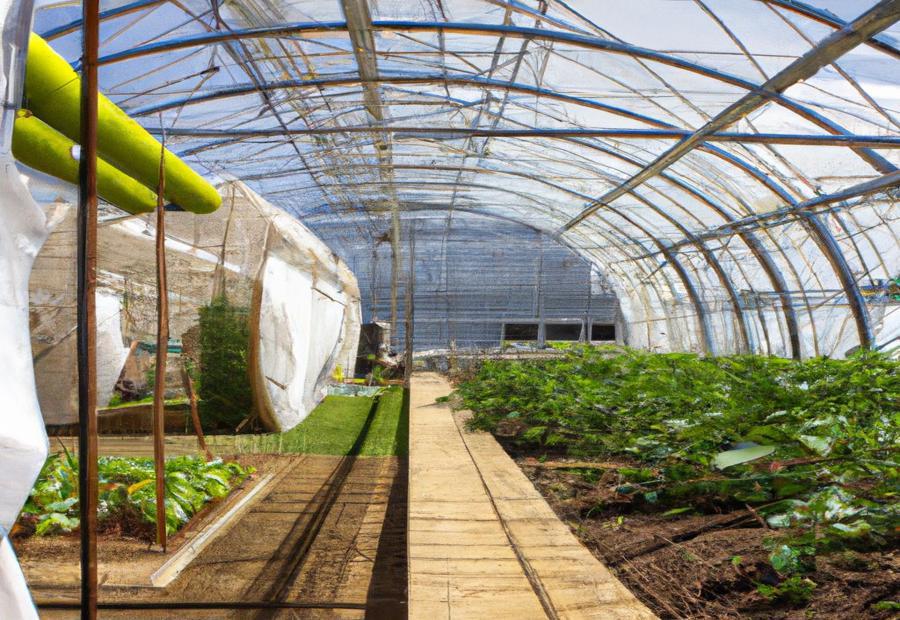
Photo Credits: Gardeninggurus.Org by Christopher Mitchell
Monitoring plant signs and providing nutrient amendments are crucial elements in greenhouse soil management and amendments. Understanding the importance of nutrient balance for healthy plants and recognizing signs of nutrient deficiencies is key in ensuring optimal plant growth. In this section, we will delve into how to address these deficiencies, equipping you with the knowledge to maintain a thriving greenhouse environment.
Importance of Nutrient Balance for Healthy Plants
Nutrient balance is key for plant health and vigor. It’s important to provide plants with the right amounts of essential elements for growth and development. The article ‘Greenhouse Soil Management And Amendments‘ explains that a balanced nutrient level helps plants cope with environmental stresses, resist diseases, and produce quality yields.
The reference data stresses the significance of nutrient balance for healthy plants. It helps them uptake nutrients while avoiding deficiencies and toxicities. Macronutrients like nitrogen, phosphorus, and potassium are necessary for root development, flowering, and fruiting. To keep a balanced nutrient level, you need to monitor soil conditions and adjust fertilizer applications.
In conclusion, nutrient balance is essential for healthy plants in greenhouses. Proper soil management and amendments give plants the nutrients they need. Regular monitoring and adjusting of nutrients based on plant signs are critical to maintain a balanced nutrient level for overall plant vitality and productivity. Don’t let your plants go hungry – learn how to spot deficiencies and give them a proper meal.
Signs of Nutrient Deficiencies and How to Address Them
Wilting and yellowing leaves can be a sign of nutrient deficiencies, such as a lack of nitrogen, iron, or magnesium. Gardeners can help by adding soil amendments with these nutrients or organic fertilizers. Poor flowering or fruit formation can mean a lack of phosphorus and potassium. Bone meal or kelp meal can fix this. Stunted growth can be caused by a lack of nitrogen. Compost or well-rotted manure can be used to improve soil fertility.
Gardeners need to use soil amendments, not just synthetic fertilizers, to address nutrient deficiencies. Compost, peat moss, and vermiculite are great organic matter resources. Sustainable gardening practices are good for plants, plus the environment. Soil amendments are the key to a greenhouse garden that looks like a rainforest!
Soil Amendments for Soil Health and Plant Growth in Greenhouses
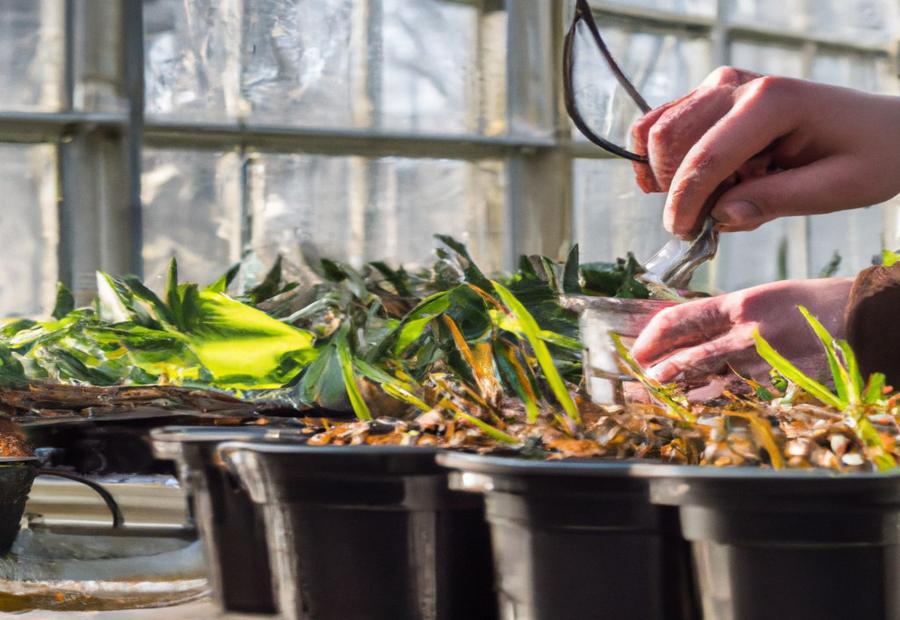
Photo Credits: Gardeninggurus.Org by Patrick Wright
Soil amendments play a crucial role in maintaining soil health and promoting optimal plant growth in greenhouses. In this section, we will explore the benefits of organic matter in soil for plant health and delve into sustainable gardening practices with organic amendments. Discover how utilizing these techniques can enhance the quality and productivity of your greenhouse crops.
Benefits of Organic Matter in Soil for Plant Health
Organic matter in soil is essential for plant health. It provides many advantages, like:
- More available vitamins, like nitrogen, phosphorus and potassium.
- Soil structure improvement by binding particles together.
- Water retention for longer periods.
- Beneficial microbes that release nutrients and enzymes for stronger plant growth.
Organic matter also increases soil fertility and resilience, suppresses weeds and reduces the need for synthetic fertilizers.
Gardeners should maintain an appropriate balance of organic matter in greenhouse soils. Compost or other natural amendments can help replenish organic matter and keep plants healthy. Harness the power of organic matter in your soil and enjoy thriving results!
Sustainable Gardening Practices with Organic Amendments
Organic amendments are key for sustainable gardening. They play a big role in making the soil healthy and supporting plant growth. Compost and peat moss are examples of these amendments. They provide organic matter that improves soil structure, water retention, and nutrient availability. Gardeners can create an environment that helps long-term plant health by using these amendments in greenhouses instead of synthetic fertilizers or harmful chemicals.
The use of organic amendments reduces the need for chemical fertilizers and cuts down on environmental impacts. Organic matter helps the soil hold onto moisture, leading to less water usage and better drought resistance. It also slowly provides essential nutrients, which helps roots to grow strong. Plants that are stronger are more able to fight off pests and diseases.
Organic amendments also make gardening more sustainable. They are usually made from recycled or renewable sources like crop residues or animal manure. Gardeners can reduce waste and make less of a carbon footprint by choosing these materials instead of synthetic ones.
By using organic amendments in greenhouses, gardeners can have a balanced ecosystem with healthier plants. This approach helps both the plants and the larger ecosystem. With careful selection and application of organic amendments, gardeners can get great results while minimizing negative impacts.
Using Soil Amendments in Soil Management Practices

Photo Credits: Gardeninggurus.Org by Randy Jones
Using soil amendments in soil management practices can significantly enhance soil fertility and reduce the need for supplemental nutrients. By implementing specific soil amendments, such as those discussed in this section, farmers and gardeners can optimize their soil’s nutrient content and improve overall plant growth and health. Understanding the benefits and proper usage of these amendments is key to achieving sustainable and productive greenhouse soil management.
Reducing the Need for Supplemental Nutrients through Soil Management
Optimizing plant growth and reducing reliance on extra fertilizers? That’s easy. Implement proper soil management practices, like organic amendments and sustainable gardening. This’ll create a nutrient-rich environment, reducing the need for synthetic fertilizers.
Compost and peat moss can provide essential nutrients to plants, while perlite and vermiculite improve aeration and root absorption. This facilitates nutrient absorption, cutting down the need for extra fertilizers.
Plus, you have to maintain a proper nutrient balance. Monitor signs of deficiencies and adjust pH levels for optimal nutrition.
Soil amendments are like multivitamins – don’t underestimate their power!
Specific Soil Amendments for Enhanced Soil Fertility
Soil amendments can help optimize the nutrient content and overall health of the soil, essential for greenhouse plants. Compost, peat moss, vermiculite, perlite, and lime are popular soil amendments. Bone meal, fish emulsion, worm castings, and rock dust are other options.
For each greenhouse plant, specific amendments must be chosen to meet their needs. Understanding the plants’ nutrient requirements and growth patterns is essential for selecting the right amendments. This can lead to enhanced soil fertility and flourishing plants.
Conclusion: Achieving Optimal Soil Health and Plant Growth with the Right Amendments
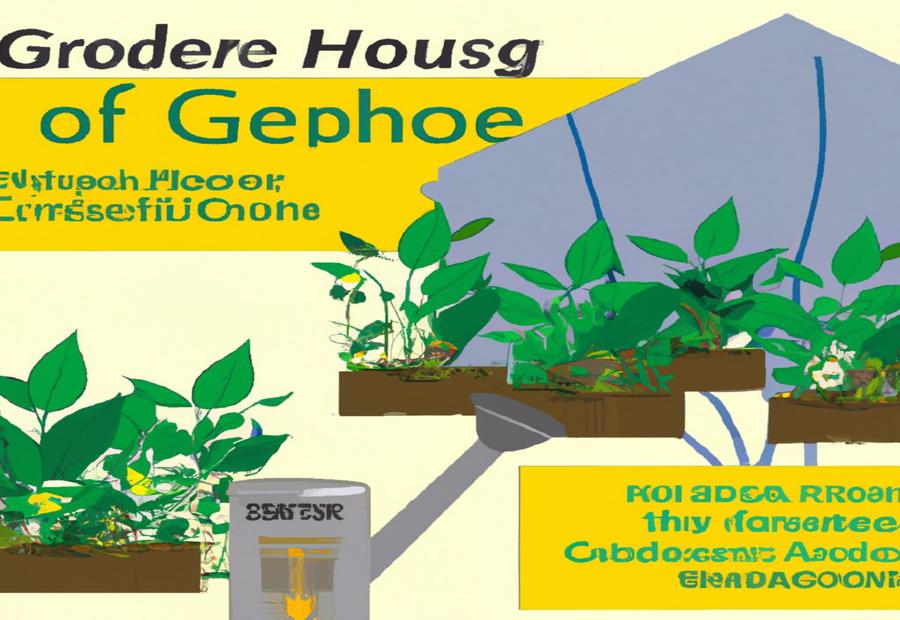
Photo Credits: Gardeninggurus.Org by Walter Lewis
To get soil & plant growth at its best, the right amendments must be used. Greenhouse soil management & amendments are essential for creating a suitable environment for plants. By picking & using the right amendments, the quality of the soil can be enhanced, essential nutrients supplied, & a balanced pH level achieved.
Organic matter is a major factor for optimizing soil health in greenhouses. Adding compost or well-rotted manure can improve the soil structure, raise nutrient availability, & boost water retention. These organic amendments help build healthy microbial populations, boosting nutrient cycling & overall soil health.
Along with organic matter, mineral amendments can optimize soil health even more. Materials such as limestone can be added to adjust the soil pH. Others, like gypsum or sulfur, can improve soil structure, increase nutrient availability, & reduce the presence of harmful elements.
Nutrient management is important for plant growth in greenhouses. This is done by testing the soil regularly to find out any nutrient deficiencies. Supplementing the soil with essential nutrients that fit the crops’ needs is key for optimal plant growth & development.
In short, the right amendments are necessary for optimal soil & plant health in greenhouses. Organic matter, mineral amendments & the correct nutrient management strategies can help create a perfect growing environment for healthy plants & high yields.
Some Facts About Greenhouse Soil Management And Amendments:
- ✅ Soil amendments are materials added to soil or soilless mix to improve its physical and biological characteristics for better plant growth. (Source: GPN Magazine)
- ✅ Organic amendments, derived from plants and animals, help separate soil particles and increase nutrient and water-holding capacities. (Source: GPN Magazine)
- ✅ Inorganic amendments, either mined or man-made, are used to physically separate soil particles. (Source: GPN Magazine)
- ✅ Organic matter, including living, dead, and decomposing plants and animals, is a major contributor to soil health. (Source: University of Maryland Extension)
- ✅ Adding compost and pine bark fines can improve soil structure, moisture retention, nutrient release, aeration, water drainage, root growth, and biological activity. (Source: University of Maryland Extension)
FAQs about Greenhouse Soil Management And Amendments
What are some peat moss substitutes for improving soil in garden beds?
Compost and pine bark fines are good substitutes for peat moss in garden beds. They both enhance soil structure, moisture retention, and nutrient release.
How can I prevent soil compaction and promote root growth in my garden?
Adding soil amendments like compost, composted manure, and soil conditioners can prevent soil compaction and promote root growth in your garden. These amendments improve soil structure and provide essential nutrients for healthier plants.
What are the benefits of using cover crops in greenhouse soil management?
Cover crops are plants grown year-round to improve soil health. They help store carbon in the soil, reduce erosion, and recycle nutrients. Using cover crops can enhance microbial viability and replenish organic matter, resulting in healthier soil for optimal plant growth.
How can amino acids contribute to soil rejuvenation in a greenhouse?
Amino acids, found in soil meal made from crushed seeds, provide nutrients for plant hormones and enzymes. Adding soil meal as a soil amendment can promote soil rejuvenation and improve overall plant health and growth in a greenhouse setting.
What are some beneficial insects for controlling pests in greenhouse gardening?
Beneficial insects like ladybugs, lacewings, and praying mantises can help control pests naturally in greenhouse gardening. Introducing these insects into the greenhouse can reduce the need for chemical pesticides and promote a balanced ecosystem.
How can mirror wall fountains enhance interior design?
Mirror wall fountains create an elegant and welcoming atmosphere while reflecting light to make the space appear larger and brighter. The soothing sound of flowing water adds a calming element to the environment. Mirror wall fountains can be customized to fit different design styles, adding a unique touch to interior decor.


